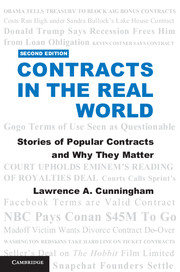Book contents
- Frontmatter
- Dedication
- Contents
- Annotated Contents
- Acknowledgments
- Introduction
- 1 Getting In: Contract Formation
- 2 Facing Limits: Unenforceable Bargains
- 3 Getting Out: Excuses and Termination
- 4 Paying Up: Remedies
- 5 Rewinding: Restitution and Unjust Enrichment
- 6 Writing It Down: Interpretation, Parol, Frauds
- 7 Performing: Duties, Modifi cation, Good Faith
- 8 Hedging: Conditions
- 9 Considering Others: Third Parties and Society
- Conclusion
- Appendix A Offering and Accepting
- Appendix B Buying and Selling Goods
- Notes
- Table of Cases
- Index
3 - Getting Out: Excuses and Termination
Published online by Cambridge University Press: 05 March 2016
- Frontmatter
- Dedication
- Contents
- Annotated Contents
- Acknowledgments
- Introduction
- 1 Getting In: Contract Formation
- 2 Facing Limits: Unenforceable Bargains
- 3 Getting Out: Excuses and Termination
- 4 Paying Up: Remedies
- 5 Rewinding: Restitution and Unjust Enrichment
- 6 Writing It Down: Interpretation, Parol, Frauds
- 7 Performing: Duties, Modifi cation, Good Faith
- 8 Hedging: Conditions
- 9 Considering Others: Third Parties and Society
- Conclusion
- Appendix A Offering and Accepting
- Appendix B Buying and Selling Goods
- Notes
- Table of Cases
- Index
Summary
The best laid schemes of mice and men often go awry.
– Robert BurnsMistake and Warranty: Madoff's Ponzi Scheme
On December 11, 2008, Bernard Madoff, revered as a savvy investor, confessed to his sons that he had perpetrated one of the largest financial scams in history, involving an estimated $65 billion. His sons turned him in – and one of them committed suicide on the first anniversary of his father's arrest.
Beginning in the 1980s, thousands of sophisticated investors, from hedge fund managers to university investment officers, entrusted millions to him and his firm, Bernard L. Madoff Investment Securities. He turned others away, increasing his allure, and delivered unmatched returns to those in on the action.
Madoff's confession revealed, however, that his firm had crafted a Ponzi scheme, using later-invested funds to repay earlier investments in escalating magnitude reaching billions of dollars. For two decades, Madoff had provided fraudulent monthly statements to investors meticulously portraying fictional securities holdings and trades. On June 29, 2009, Madoff was sentenced to 150 years in prison.
Among investors stung by Madoff's scam were Steven Simkin, a prominent New York real estate attorney with the firm of Paul, Weiss, Rifkind, Wharton & Garrison, and Laura Blank, a distinguished lawyer working for the City University of New York and heiress to the fortune of the neckwear manufacturing company, J. S. Blank.
After thirty years of marriage and raising two children, Steven and Laura separated in 2004, not long after Laura's mother had died. To finalize their divorce, on June 27, 2006, Steven, who lived in Scarsdale, and Laura, who lived in Manhattan, signed an agreement dividing their property.
In their negotiations, the couple listed their marital assets, including four cars, the Scarsdale and Manhattan homes, and millions in bank, securities, and retirement funds, including their investments with Madoff. The homes and cars aside, it appeared that the couple's total assets amounted to $13.2 million. The agreement provided that Steven would keep most assets in exchange for paying Laura $6.6 million in cash. Thirty months later, when Madoff's Ponzi scheme was exposed, they discovered that the value of the investments was overstated by $5.4 million because of it.
After Madoff was arrested, Steven wanted to rescind the settlement agreement with Laura and redo that part of their deal.
- Type
- Chapter
- Information
- Contracts in the Real WorldStories of Popular Contracts and Why They Matter, pp. 73 - 101Publisher: Cambridge University PressPrint publication year: 2016



